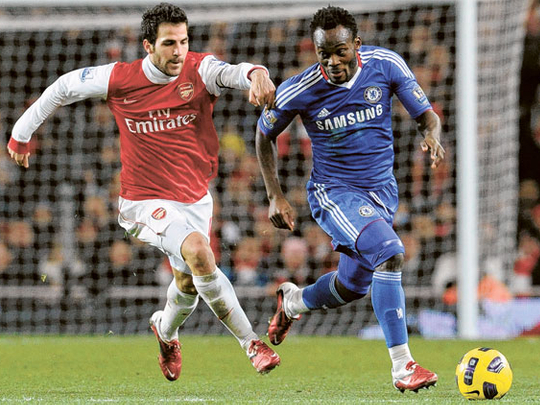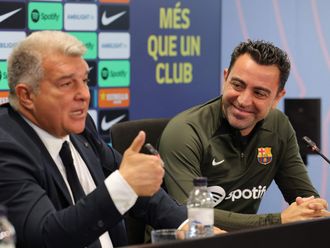
London: Contrary to modern prejudice there can be a lot going on in a footballer's head. Teddy Sheringham allegedly carried his first five yards in his. Which, if nothing else, gave him the most capacious cranium in sport.
Meanwhile, according to his manager, Cesc Fabregas has a hamstring in the brain. Many a time in the recent past this condition has compromised the Spaniard's place in the Arsenal team.
And while not implying his captain is yet ready to take on Harry Kewell's discarded mantle as the Premier League's leading hypochondriac, Arsene Wenger reckons it is time that he stopped worrying about his fitness every time he plays and starts to enjoy the game again.
There can be no doubt that the returning Spaniard will have enjoyed Monday night's game. How he will have relished popping home his team's second goal from Theo Walcott's neatly inviting cut back.
How he will have delighted, moments later, in returning the favour for the England winger to finish deliciously. But most of all, how Fabregas will have savoured leading his side as they emerged beneath from what was becoming the most suffocating statistical blanket in the Premier League.
Finally, after being out-muscled at Old Trafford, with their captain's feet back on the tiller, Arsenal found the wherewithal to overcome one of their main rivals. It was about time.
Counterpoint
To counter the claim that Arsenal cannot beat Chelsea, the match programme featured prominently the club's record against their London rivals since Wenger's appointment: Played 41, Won 17, Drawn 11, Lost 13.
A sound set of statistics, perhaps. If you discount the fact that five of those 13 defeats have come in the last five meetings. Arsenal's title hopes depended on that statistic becoming history.
How relieved Wenger would have been, then, that Fabregas' malfunctioning mental muscle had loosened sufficiently for him to turn out. That's what he needed on a crisp Yuletide evening when all we had to keep us warm was the crackle of shins under close attention of a set of studs: a player whose mental computer works in the most over-wrought circumstances.
Playing just behind Robin van Persie at the apex of a midfield five, Fabregas' first touch of the game — a lovely flick to Samir Nasri — did not suggest a player deficient in confidence. A couple of moments later, a little turn and run, outwitting John Obi Mikel and Frank Lampard on the edge of the area, reminded Arsenal's support quite what he brings to their side.
Wenger believes, however, that Fabregas' contribution extends way beyond such cameos. At merely 23, he acts as an elder statesman, guiding the more callow talents around him. And indeed, they have much to learn from him.
It would help if Walcott could master his touch (particularly when racing on to a pass in the penalty area), or Jack Wilshire his ability to find a man (particularly in those confined spaces in which Spanish players seem to relish receiving).
Not that there was any critique of Walcott from the home fans, not just for that third goal, but also for the manner he cleverly drew the still unforgiven Ashley Cole into a booking, an event celebrated with the vigour of a championship win.
But even with Fabregas back and their team three goals to the good, there is something missing from Arsenal's make-up that sends alarm spinning through their supporters every time the opposition attack.











